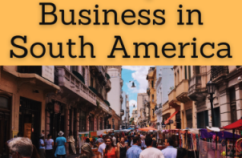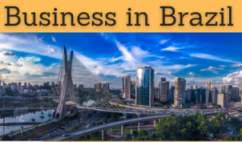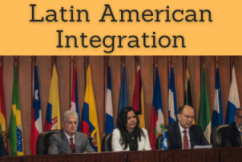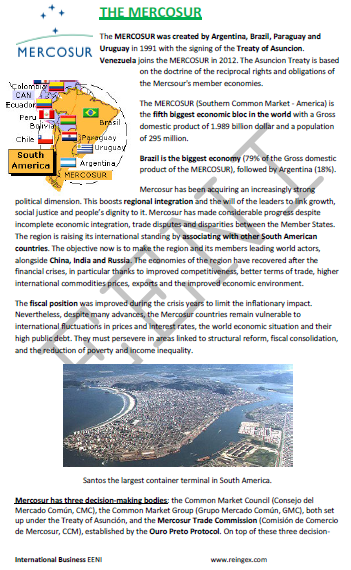MERCOSUR (Southern Common Market)

Free transit of goods MERCOSUR (Brazil, Argentina, Uruguay, Paraguay)
- Introduction to the MERCOSUR
- Treaty of Asuncion
- Administrative Secretariat of the MERCOSUR
- New institutional phase of the MERCOSUR
- MERCOSUR political, economic, and commercial
- Member countries of the MERCOSUR
- Incorporation of Venezuela and Bolivia (accession process)
- MERCOSUR Customs Union and Economic Integration Agreement
- MERCOSUR Common External Tariff
- MERCOSUR Regime of Origin (ROM)
- Businessperson of the MERCOSUR:

MERCOSUR Free Trade Agreements: Chile, Andean Community, Chile, Mexico, Peru, India, Egypt, Israel, SACU, and the EU, Global System of Trade Preferences.
The objectives of the subject “MERCOSUR” are to:
- Understand the aims (regional integration, socio-economic development) and the organizational structure of the MERCOSUR
- Analyze the impact of the MERCOSUR on the economy and the trade among the member countries
- Understand the implications of the new incorporations of Venezuela and Bolivia to the MERCOSUR
- Analyze the common external tariff, the common classification and the rules of origin of the MERCOSUR
- Evaluate the free movement and the intra-MERCOSUR trade
- Know the MERCOSUR Free Trade Agreements

The Subject “MERCOSUR” belongs to the following Online Programs taught by EENI Global Business School:
Masters: International Business, Foreign Trade.
Doctorate: American Business, World Trade.

Languages:  or
or  MERCOSUR
MERCOSUR  MERCOSUR
MERCOSUR  MERCOSUL.
MERCOSUL.


- Credits of the Subject “MERCOSUR”: 2

- Duration: two weeks

Sample - MERCOSUR

Brazil is the largest economy (79% of the GDP of the MERCOSUR), followed by Argentina (18%).
The MERCOSUR was created by Argentina, Brazil, Paraguay, and Uruguay in 1991 with the signing of the Treaty of Asuncion.
- In 2006, it was signed the Protocol of Accession of Venezuela to the MERCOSUR.
- Venezuela is a member of the MERCOSUR since 2012
- The entry of Venezuela to the bloc will occur gradually
- Today is Suspended
- Paraguay was suspended off the MERCOSUR in 2012 to 2013
- Bolivia: Adhesion of Venezuela to the MERCOSUR
- The associate members of the MERCOSUR are Bolivia, Chile, Colombia, Ecuador, Peru, Guyana and Suriname
The Asuncion Treaty is based on the doctrine of reciprocal rights and obligations of the member countries of the MERCOSUR
The MERCOSUR is the fifth-largest economic bloc in the World with a GDP of 1.989 billion dollars and a population of 295 million
The MERCOSUR is a Christian economic bloc with a large Catholic majority.
The objectives of the MERCOSUR are:
- Free transit of products, services, and factors between the member economies in the MERCOSUR
- Fixing of a common external tariff and adopting a common Foreign Trade policy
- Macroeconomics and sectoral policies coordination of the member States relating to the foreign trade, agriculture, industry, taxes, monetary system, exchange and capital, trade in services, customs, logistics, and communications
- Engagement by the members of the MERCOSUR to make the necessary adjustments to their laws in relevant areas to improve the integration process
The European Union-MERCOSUR relationship is based on the EU-MERCOSUR Interregional Cooperation Framework Agreement signed on 1995 in Madrid between the EU and its member economies and the MERCOSUR and its Party States. The EU is the largest trading partner of the MERCOSUR and largest foreign investor in the region.
The Intra-MERCOSUR trade tariff is 0%, and a common external tariff applies to trade with non-MERCOSUR Countries.
A Preferential Trade Agreement with India is in place, a free trade agreement with Israel is awaiting Congress' approval, and different International Trade Agreements are under negotiation with the SACU, the GCC member countries, and Morocco.
The MERCOSUR belongs to the Latin American Economic Area.


(c) EENI Global Business School (1995-2024)
We do not use cookies
Top of this page


